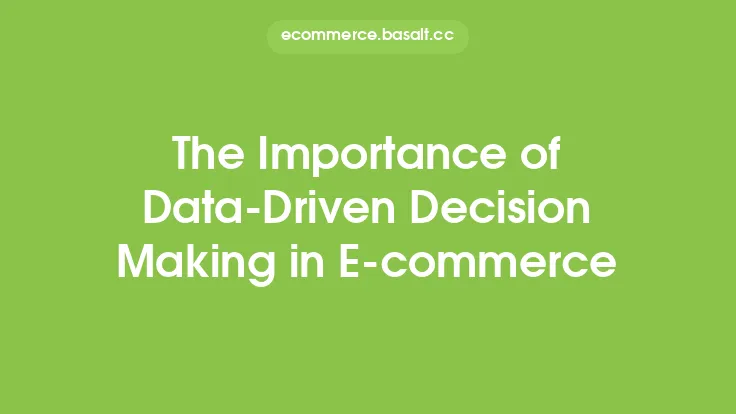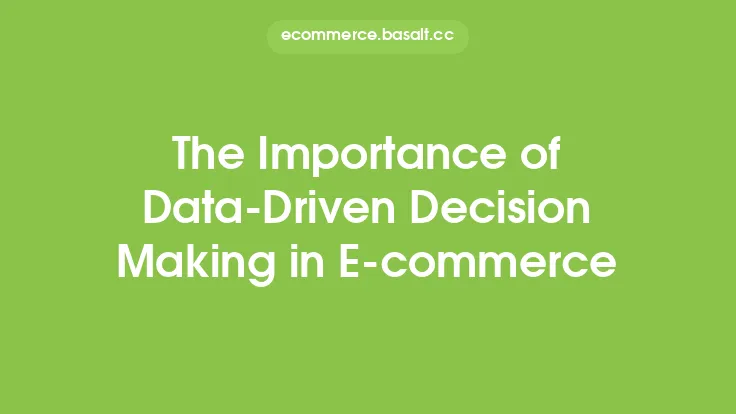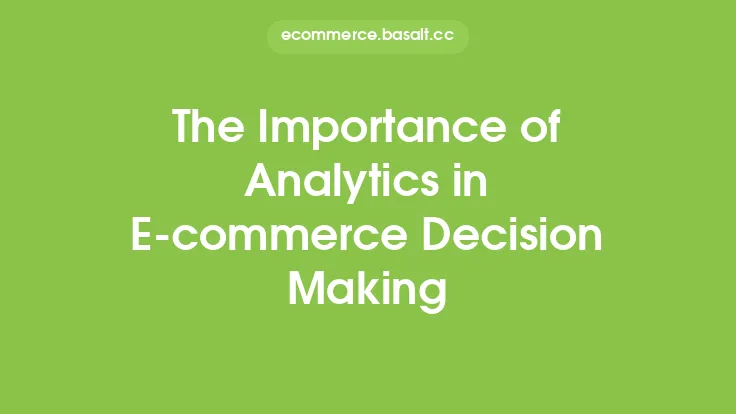In today's fast-paced and highly competitive e-commerce landscape, making informed decisions is crucial for businesses to stay ahead of the curve. With the vast amount of data available, e-commerce companies can no longer rely on intuition or guesswork to drive their decision-making processes. Instead, they must adopt a data-driven approach to optimize their operations, improve customer experiences, and ultimately drive revenue growth. Data-driven decision making is a methodology that involves using data and analytics to inform business decisions, rather than relying on intuition or personal experience. This approach enables e-commerce businesses to make more accurate predictions, identify areas for improvement, and measure the effectiveness of their strategies.
What is Data-Driven Decision Making?
Data-driven decision making is a process that involves collecting, analyzing, and interpreting data to inform business decisions. In e-commerce, this can include data on customer behavior, sales trends, website performance, and marketing effectiveness. By leveraging data and analytics, e-commerce businesses can gain a deeper understanding of their customers, identify opportunities for growth, and optimize their operations to improve efficiency and profitability. Data-driven decision making involves several key steps, including data collection, data analysis, and decision making. E-commerce businesses must first collect relevant data from various sources, such as website analytics, customer feedback, and sales data. This data is then analyzed to identify trends, patterns, and insights that can inform business decisions.
Benefits of Data-Driven Decision Making in E-commerce
The benefits of data-driven decision making in e-commerce are numerous. By leveraging data and analytics, e-commerce businesses can improve their decision-making processes, optimize their operations, and drive revenue growth. Some of the key benefits of data-driven decision making in e-commerce include improved accuracy, increased efficiency, and enhanced customer experiences. Data-driven decision making enables e-commerce businesses to make more accurate predictions and informed decisions, reducing the risk of errors and improving overall performance. Additionally, data-driven decision making can help e-commerce businesses to identify areas for improvement, optimize their operations, and streamline their processes, leading to increased efficiency and productivity.
Key Components of Data-Driven Decision Making in E-commerce
There are several key components of data-driven decision making in e-commerce, including data collection, data analysis, and decision making. E-commerce businesses must first collect relevant data from various sources, such as website analytics, customer feedback, and sales data. This data is then analyzed to identify trends, patterns, and insights that can inform business decisions. Some of the key data sources for e-commerce businesses include website analytics tools, customer relationship management (CRM) systems, and social media analytics platforms. E-commerce businesses must also have the right tools and technologies in place to support data-driven decision making, such as data visualization software, statistical modeling tools, and machine learning algorithms.
Best Practices for Implementing Data-Driven Decision Making in E-commerce
To implement data-driven decision making in e-commerce, businesses must follow several best practices. First, they must establish a data-driven culture that encourages the use of data and analytics to inform business decisions. This involves providing training and resources to employees, as well as establishing clear goals and objectives for data-driven decision making. E-commerce businesses must also have the right tools and technologies in place to support data-driven decision making, such as data visualization software and statistical modeling tools. Additionally, e-commerce businesses must ensure that their data is accurate, complete, and up-to-date, and that it is properly integrated and analyzed to inform business decisions.
Common Challenges and Limitations of Data-Driven Decision Making in E-commerce
While data-driven decision making offers numerous benefits for e-commerce businesses, there are also several common challenges and limitations to consider. One of the biggest challenges is data quality, as inaccurate or incomplete data can lead to poor decision making. E-commerce businesses must also ensure that they have the right tools and technologies in place to support data-driven decision making, as well as the necessary skills and expertise to analyze and interpret data. Additionally, e-commerce businesses must be aware of the potential risks and limitations of data-driven decision making, such as the risk of over-reliance on data and the potential for bias in data analysis.
Future of Data-Driven Decision Making in E-commerce
The future of data-driven decision making in e-commerce is exciting and rapidly evolving. With the increasing use of artificial intelligence, machine learning, and the Internet of Things (IoT), e-commerce businesses will have access to even more data and insights to inform their decision-making processes. Additionally, the use of cloud-based technologies and big data analytics will enable e-commerce businesses to process and analyze large amounts of data in real-time, leading to faster and more informed decision making. As the e-commerce landscape continues to evolve, it is likely that data-driven decision making will become even more critical for businesses to stay ahead of the curve and drive revenue growth. By leveraging data and analytics, e-commerce businesses can optimize their operations, improve customer experiences, and ultimately drive long-term success.





